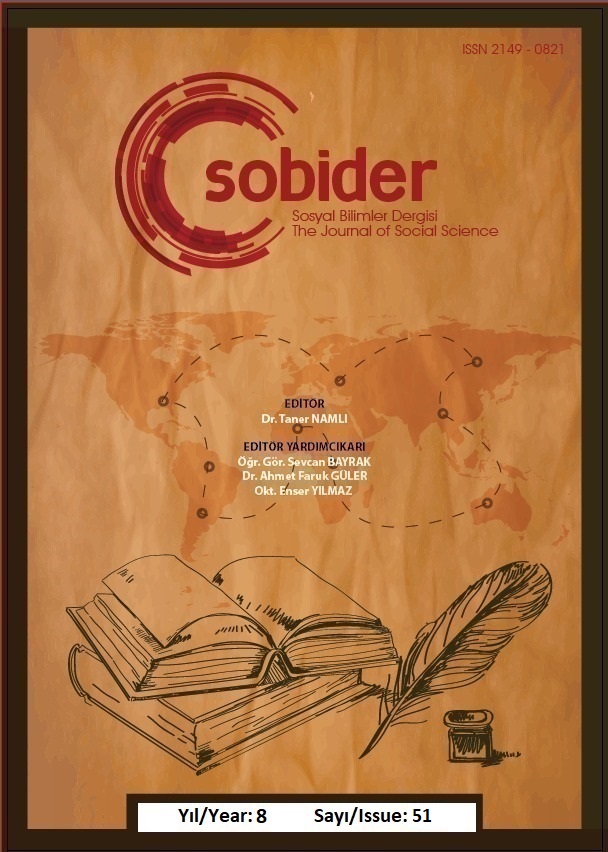Author :
Abstract
Araştırmanın amacı, genç bireylerin farklı değişkenlerine göre kariyer tutum düzeylerini incelemektir. Araştırmanın çalışma grubunu İstanbul Üniversitesi-Cerrahpaşa Spor Bilimleri Fakültesi Spor Yöneticiliği Bölümü’nde öğrenim görmekte olan 105 (%60,7) erkek, 68 (% 39,3) kadın olmak üzere toplam 173 öğrenci gönüllü katılım göstererek oluşturulmuştur. Araştırmada kişisel bilgi formunun yanı sıra Rottinghaus, Day ve Borgen (2005) tarafından geliştirilen, Kalafat (2012) tarafından geçerlik ve güvenirlik çalışması yapılan “Kariyer Geleceği Ölçeği (KARGEL)” kullanılmıştır. KARGEL 5’li likert tipi, 25 madde, 3 alt boyuttan oluşmaktadır. Kolmogorov-Smirnov normallik testi sonucunda verilerin normal dağılım göstermediğinin anlaşılmasından sonra analizler iki değişkenli veriler için Mann Whitney U testi, ikiden fazla değişkenler için ise Kruskall Wallis testi uygulanmıştır. Bireylerin cinsiyet, sınıf ve akademik not ortalamalarına göre KARGEL alt boyutları arasında anlamlı farklılıklar tespit edilmiştir. Sonuç olarak; genç bireylerin farklı değişkenlerine göre kariyer tutumlarının değiştiği, akademik başarının kariyer tutumu üzerinde etkisi olduğu sonucuna varılmıştır.
Keywords
Abstract
The aim of the study is to examine the career attitude levels of young individuals according to different variables. The study group of the research was formed by voluntary participation of a total of 173 students, 105 (% 60,7) male and 68 (% 39,3) female, studying at the Department of Sports Management of Istanbul University-Cerrahpaşa Sports Sciences Faculty. In addition to the personal information form, the "Career Future Inventory (CFI)" developed by Rottinghaus, Day and Borgen (2005) and whose validity and reliability study was conducted by Kalafat (2012) were used in the study. CFI consists of 5-point likert type, 25 items, 3 sub-dimensions. As the result of the Kolmogorov-Smirnov normality test, it was understood that the data did not show normal distribution, the Mann-Whitney U test was used for the analysis of bivariate data, and the Kruskall Wallis test for more than two variables. Significant differences were found between CFI sub-dimensions according to the gender, class and academic grade point averages of the individuals. As a result; It was concluded that career attitudes of young individuals change according to different variables and academic success has an effect on career attitude.
Keywords
- Bayındır, S. (2019). Bireylerin kişilik tiplerinin kariyer planlama ve geliştirme üzerine etkileri, Yüksek Lisans Tezi, Karabük Üniversitesi Sosyal Bilimler Enstitüsü İşletme Anabilim Dalı.
- Büyükyılmaz, O., Ercan, S. ve Gökerik, M. (2016). Öğrencilerin Kariyer Planlama Tutumlarının Demografik Faktörler Açısından Değerlendirilmesi: Karabük Üniversitesi İşletme
- Coetzee, M. ve Harry, N. (2015). Gender and Hardiness as Predictors of Career Adaptability: an Explotary Study Among Black Call Centre Agents, South African Journal of Psychology, 45(1), 81-92.
- Çiftçi, E. (2020). Stres kaynaklarının çalışanların kariyer yönetimlerine etkileri: kamu kurumu çalışanları üzerine değerlendirme. Yüksek Lisans Tezi. Ufuk Üniversitesi Sosyal Bilimler Enstitüsü İşletme Anabilim Dalı İnsan Kaynakları Yönetimi Programı.
- Çilingir, N. (2014). Kariyer yönetimi uygulamalarının örgütsel bağlılık üzerine etkisi. Yayınlanmamış Yüksek Lisans Tezi. Osmaniye Korkut Ata Üniversitesi, Sosyal Bilimler Enstitüsü, İşletme Anabilim Dalı.
- Göktaş, E. (2018). Yetkinliğe dayalı kariyer planlama süreci ve bir uygulama. Yüksek lisans tezi. Muğla Sıtkı Koçman Üniversitesi Sosyal Bilimler Enstitüsü Çalışma Ekonomisi ve Endüstri İlişkileri Anabilim Dalı.
- Inkson, K. (2007). Understanding Careers: The metaphors of working lives. London: Sage Publicaton.
- Kalafat, T. (2012). Kariyer Geleceği Ölçeği (KARGEL): Türk Örneklemi İçin Psikometrik Özelliklerinin İncelenmesi, Türk Psikolojik Danışma ve Rehberlik Dergisi, 4(38), 169179.
- Karakaya, İ. (2012). Bilimsel araştırma yöntemleri. A. Tanrıöğen (Edt.) Bilimsel araştırma yöntemleri. Ankara.
- Karasar, N. (2020). Bilimsel Araştırma Yöntemi: Kavramlar İlkerler Teknikler. Nobel Akademik Yayıncılık.
- Kılıç, Y., Coşkuner, Z. ve Karakaya, Y.E. (2020). Spor Bilimleri Alanında Eğitim Alan Öğrencilerin Kariyer Geleceklerine Yönelik Tutumları, Uluslararası Toplum Araştırmaları Dergisi, 15(23), 2064-2078.
- Mutlu, H. (2020). Kariyer gelişiminin kariyer bağlılığı ve kariyer memnuniyeti üzerindeki etkileri: Otel çalışanları üzerinde bir araştırma. Yüksek Lisans Tezi. Süleyman Demirel Üniversitesi Sosyal Bilimler Enstitüsü Turizm İşletmeciliği Anabilim Dalı.
- Rottinghaus, P. J., Day, S. X., & Borgen, F. H. (2005). The Career Futures Inventory: A measure of career-related adaptability and optimism. Journal of Career Assessment, 13(1), 3-24.
- Seçer, B. ve Çınar, E. (2011). Bireycilik ve yeni kariyer yönelimleri. Yeni ve Ekonomi, 18(2), 49-62.
- Şimsek, M. Ş., Çelik, A., & Akatay, A. (2016). İnsan Kaynakları Yönetimi ve Kariyer Uygulamaları (3. Baskı). Konya: Eğitim Kitabevi.
- Uçar, B. (2020). Spor eğitim alan öğrencilerin mesleki kimlik durumları, girişimcilik niyetleri ve kariyer planlama tutumları arasındaki ilişki. Yüksek Lisans Tezi. Fırat Üniversitesi Sağlık Bilimleri Enstitüsü Beden Eğitimi ve Spor Anabilim Dalı.
- Temel, V. ve Nas, K. (2018). Beden Eğitimi Ve Spor Yüksekokulu Öğrencilerinin Kariyer Geleceği Algı Düzeylerinin İncelenmesi, İnönü Üniversitesi Beden Eğitimi ve Spor Bilimleri Dergisi (İÜBESBD), 5(3), 35-45.
- Üzüm, B. ve Uçkun, S. (2015). Büro Yönetimi Ve Yönetici Asistanlığı Öğrencilerinin Demografik Özellikleri İle Kariyer Geleceği Beklentilerinin Ölçülmesi: Kocaeli Myo Örneği, Elektronik Mesleki Gelişim ve Araştırmalar Dergisi, 3(1), 71-80.





